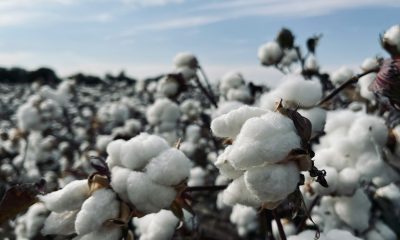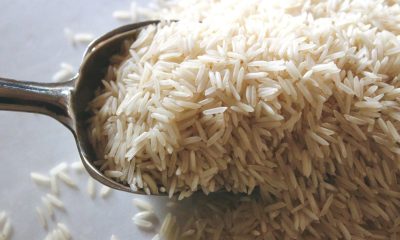Markets
Global Coffee Markets Surge as Scarce Supplies and Crop Damage Drive Up Prices
New York and London markets closed higher, driven by scarce coffee offers from Vietnam and Indonesia, though Brazilian offers remain available. Vietnam’s and Brazil’s coffee crops suffered earlier damage, leading to lower expected yields, especially for Robusta and Arabica beans. Indonesian coffee producers are holding back, awaiting higher prices before selling.
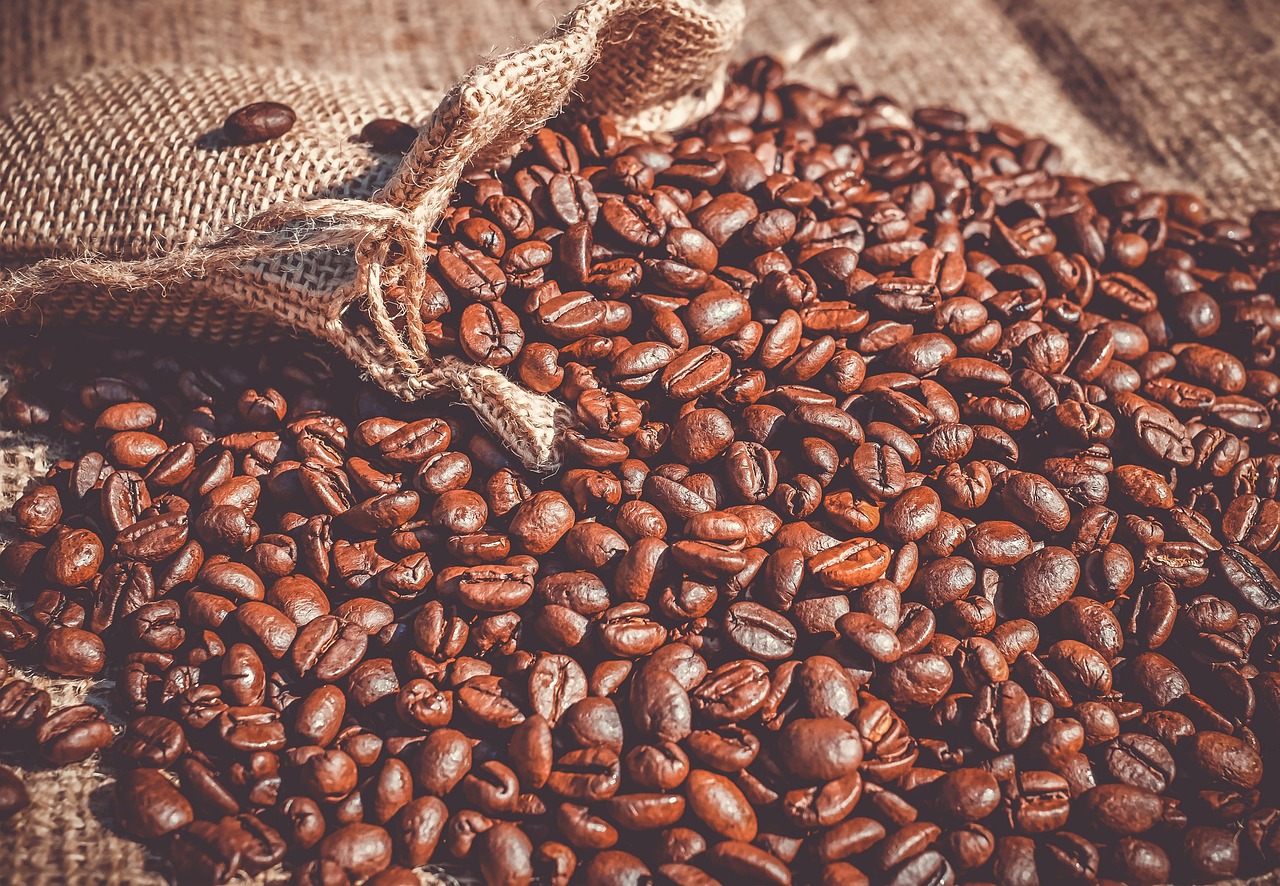
Wheat: Wheat was higher in all three markets last week on stable overseas prices reported in Russia and Europe and the wrap up of the Wheat harvest and reports of reduced cash movement here in the US.
Ideas of good crops in the US and Canada went against reports of dry weather in eastern Europe and Russia and too wet weather in France and Germany along with Spring Wheat areas of Russia are still heard and the weather there affecting world production estimates. There were more reports of dry conditions coming this week to Russian growing areas although Spring Wheat areas have seen too much rain. Eastern Europe is also hot and dry. Western Europe has seen too much rain.
Weekly Chicago Soft Red Winter Wheat Futures
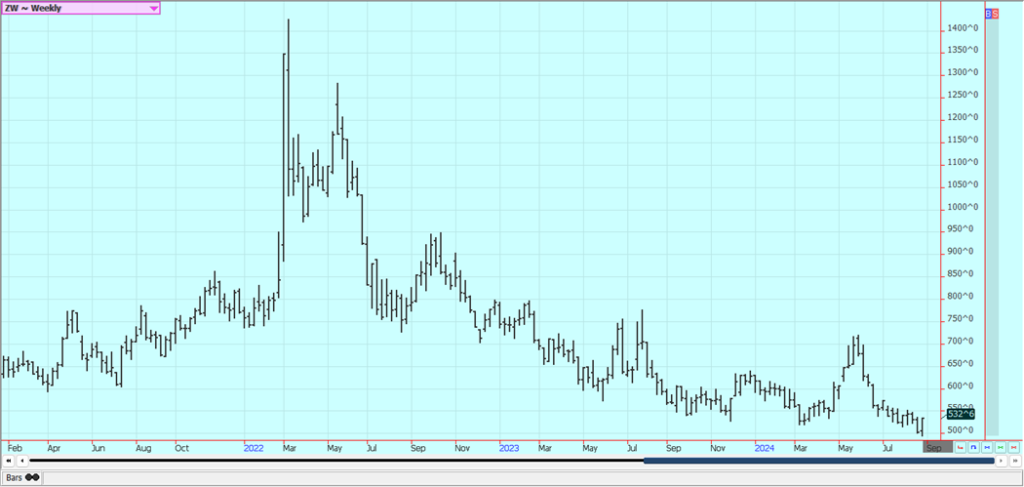
Weekly Chicago Hard Red Winter Wheat Futures
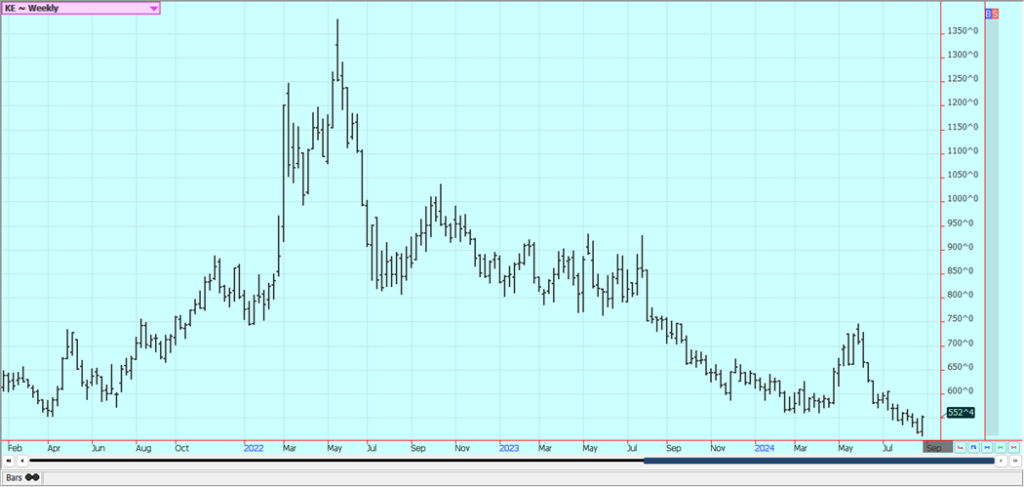
Weekly Minneapolis Hard Red Spring Wheat Futures
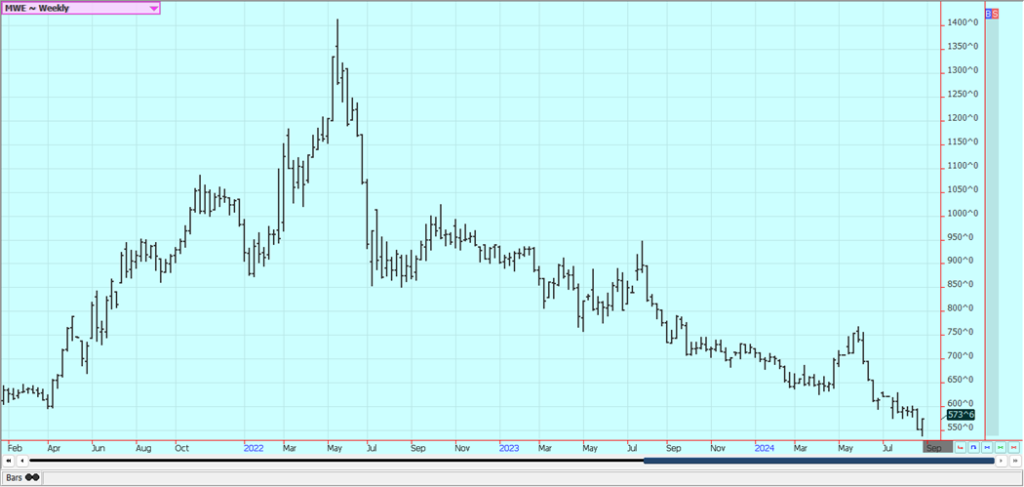
Corn: Corn and Oats closed higher last week on speculative buying and some commercial buying as cooler and dry weather was reported in just about all of the Midwest and is forecast for the week. Producer selling of old crop supplies wrapped up last week before September First Notice Day last Friday.
Ideas of very strong yields are still heard and harvest is just a few weeks away. Increased US demand comes from the fact that Corn prices are already the cheapest in the world. Current forecasts call for cooler and drier weather for the Midwest for the next week or longer.
Weekly Corn Futures
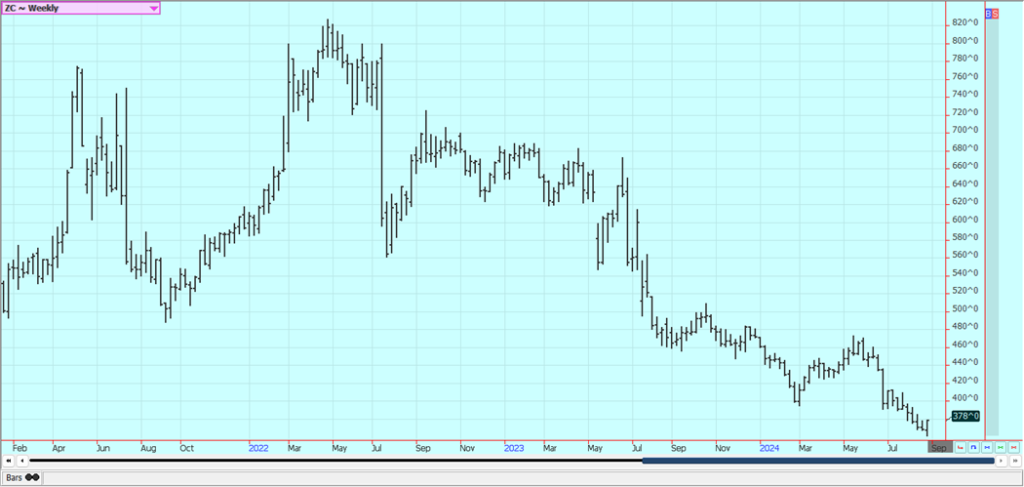
Weekly Oats Futures
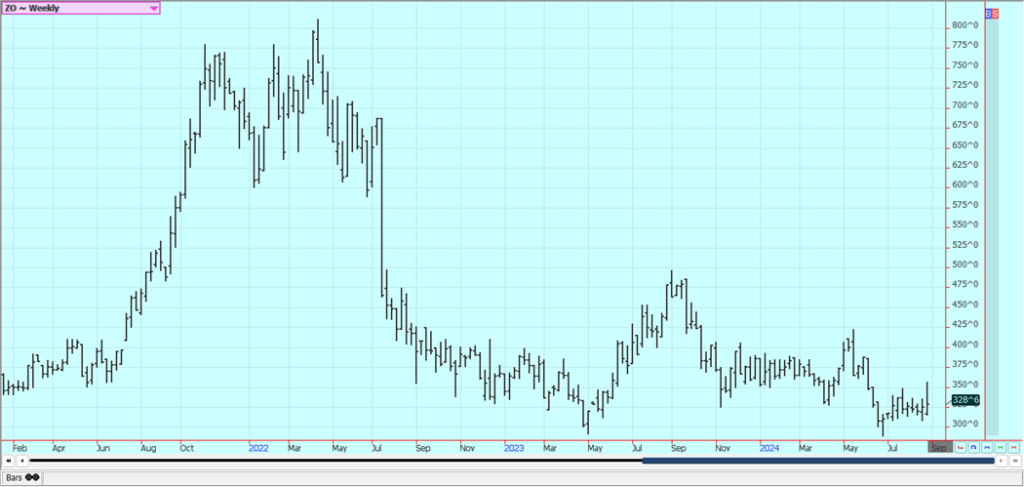
Soybeans and Soybean Meal: Soybeans and the products were higher last week on speculative buying. Stronger demand news and First Notice Day last Friday were reasons to trade the market. There is also concern about the hot and dry weather seen in the Midwest early last week that could hurt pod fill. The weather is turning cooler now but it should remain dry. Reports indicate that China is buying a lot in the US but overall export demand is begind average. Domestic demand has been strong in the US.
Weekly Chicago Soybeans Futures
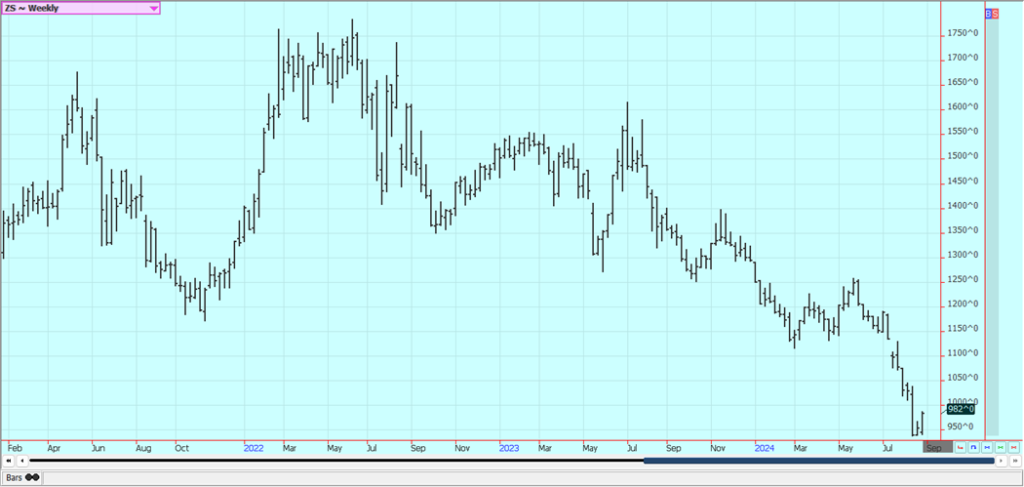
Weekly Chicago Soybean Meal Futures
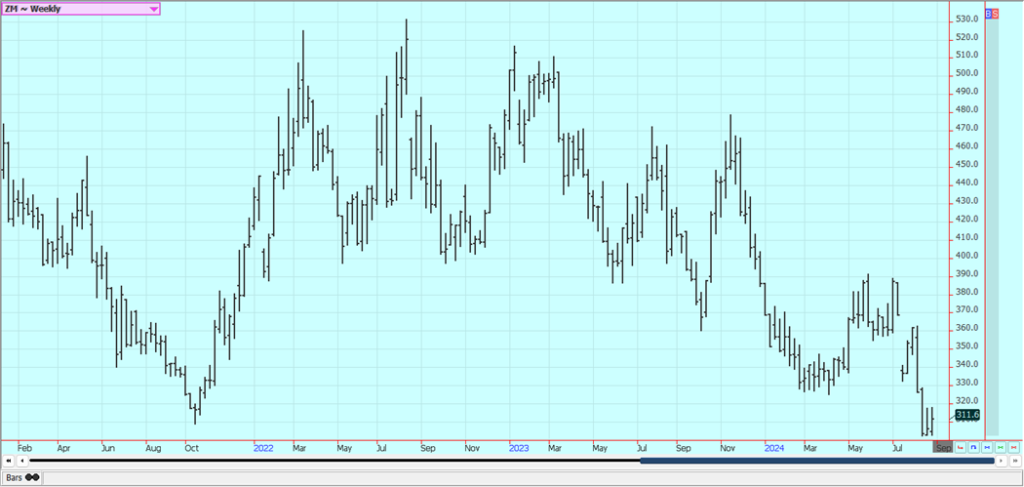
Rice: Rice closed little changed last week after failing to sustain a move higher and what appeared to be speculator selling in September before First Notice Day. The back months were lower as the trade felt the ongoing harvest.
The US weather has been an issue much of the growing season with too much rain early in the year. Some areas are now too hot and dry, especially in Texas, and Texas yields are down as a result as the harvest moves forward. However, planted area has increased from last year
Weekly Chicago Rice Futures
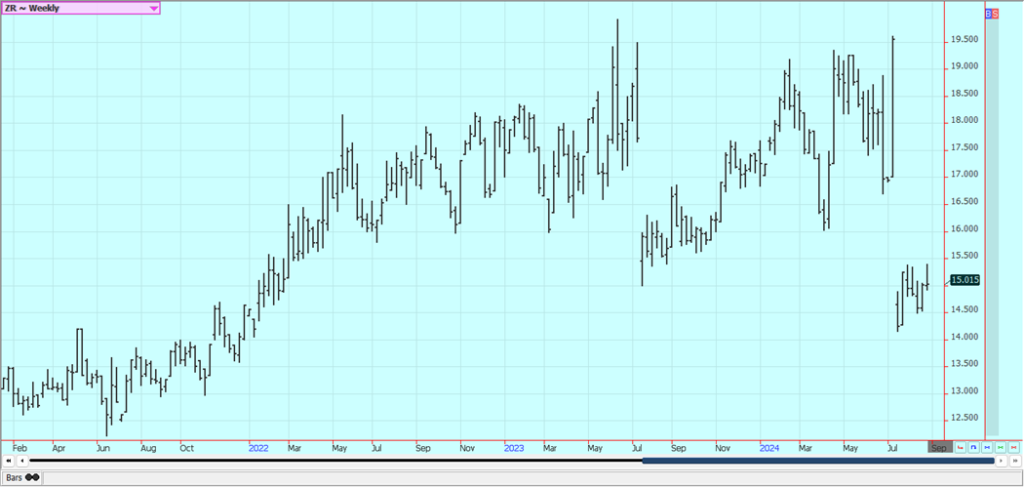
Palm Oil and Vegetable Oils: Palm Oil was higher last week on hopes of improving demand as Indonesia intends to increase its use of Palm Oil in its biofuels blends and increase biofuels to 40% of consumption. It could become 50% if the new president gets his way. Production reports indicate that the increase in production is less than expected at this time. Reports indicate that production is rising as well.
Export demand has been very strong in recent private reports but has been weaker in recent days. There is talk of increased supplies available to the market, and the trends are down on the daily charts. Canola was higher and trends remain up on ideas of reduced supplies even with the harvest starting soon. The weather has been hot and dry in Canada and it looks like Canola production has been impacted. The weather has called for dry conditions in the Prairies and yields are expected to be the same or less.
Weekly Malaysian Palm Oil Futures:
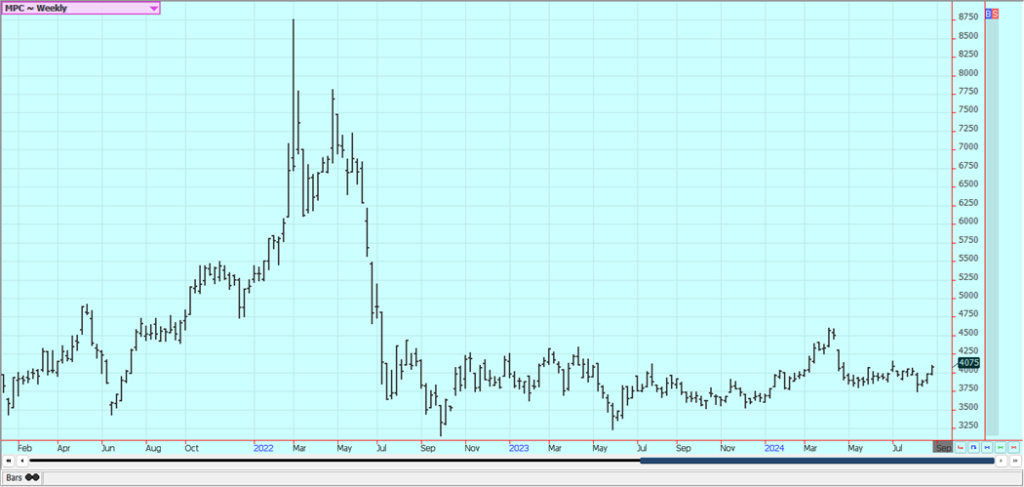
Weekly Chicago Soybean Oil Futures
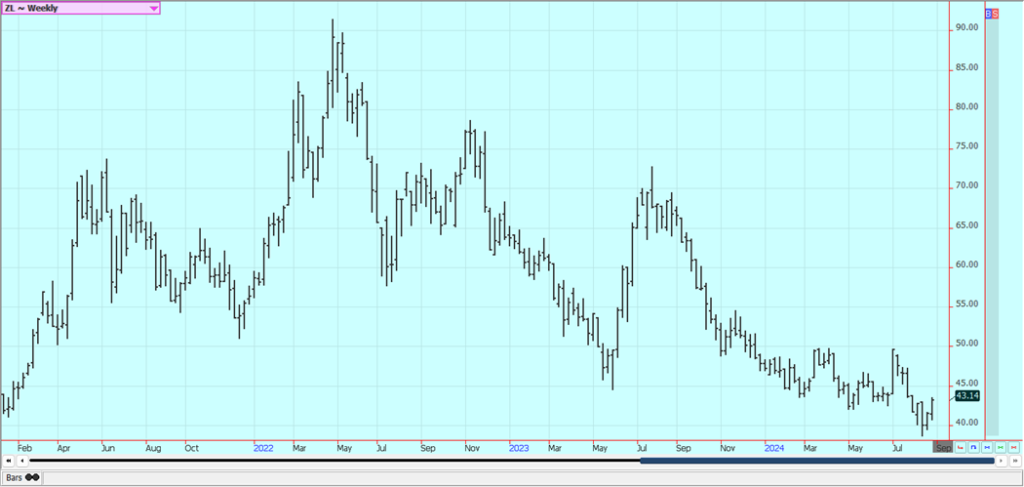
Weekly Canola Futures
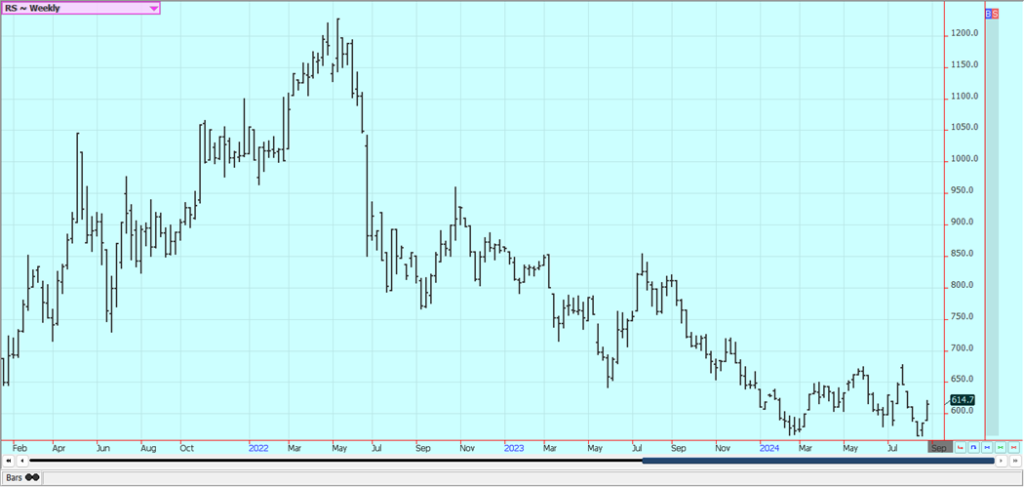
Cotton: Cotton was a little lower in range trading last week as the overall situation is bullish with reduced production potential again this year and slightly improving demand. There are still ideas of weaker demand potential against an outlook for improved US production in the coming year. Speculators see no reason to buy except to cover short positions as there have been demand concerns about Bangladesh and China and ideas are that production is strong enough.
The Delta should have the best looking crops right now, but crops in other areas are more suspect. Texas and the Southeast have seen some extreme heat so far this year, and Texas has also seen dry conditions at times during the growing season. Moderate temperatures are likely for the Delta and Southeast this week after a very hot week last week. Demand has been weaker so far this year but there are hopes for improved demand with the lower prices.
Weekly US Cotton Futures
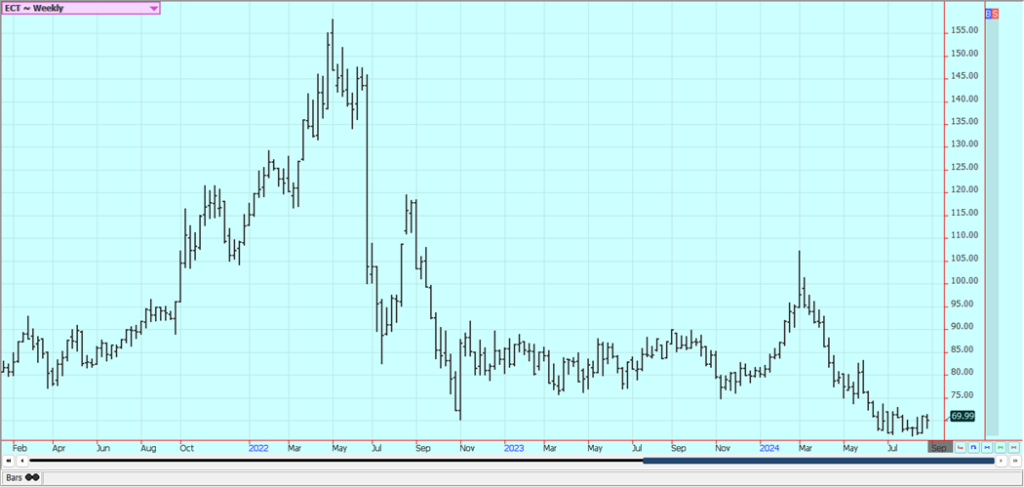
Frozen Concentrated Orange Juice and Citrus: FCOJ closed a little lower last week on apparent speculative selling ahead of Frist Notice Day and as ideas of reduced production continue against reports of stronger demand as forecasts call for no tropical activity in the near future in the Atlantic. Nothing appeared threatening in the forecasts for this week as the current tropical system should stay in the ocean and there is nothing in the ocean to suggest that a storm is on its way to Florida.
A very active year is forecast and there have been some reports of flooding in the state even with no huge storms. The market remains well supported in the longer term based on forecasts for tight supplies and very hot weather in Florida. The reduced production also appears to be at the expense of the greening disease. There are no weather concerns to speak of for Florida or for Brazil right now.
Weekly FCOJ Futures
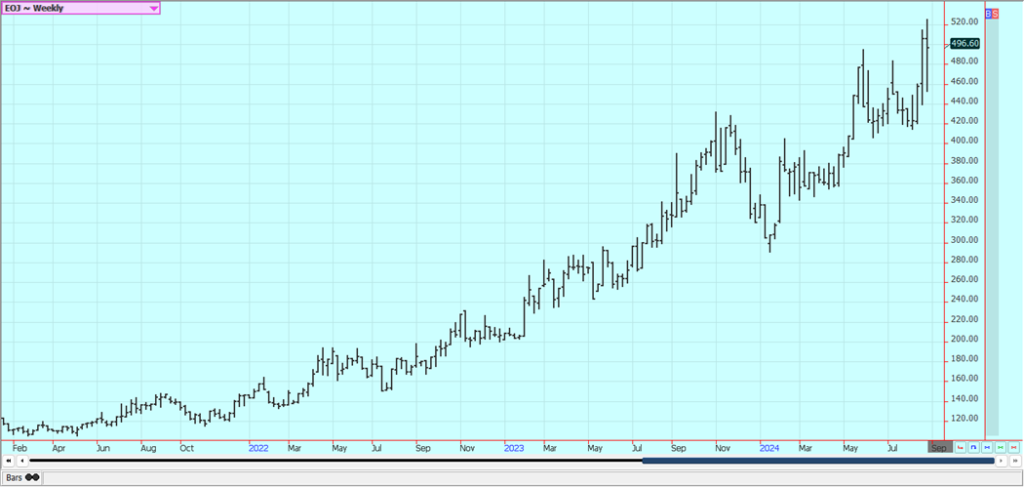
Coffee: New York and London closed higher last week with coffee offers from Vietnam and Indonesia still hard to find but offers from Brazil are in the coffee market. Indonesian coffee offers are now less as coffee producers wait for higher prices before selling.
Damage was done to crops earlier in the growing season in Vietnam and lower coffee production is now expected for the next crop. There were also reports of poor Robusta yields in Brazil during the harvest due to small bean sizes but offers have been strong so far this season. Arabica yields in Brazil and Colombia are reported to be less this year due to extreme weather in both countries.
Weekly New York Arabica Coffee Futures
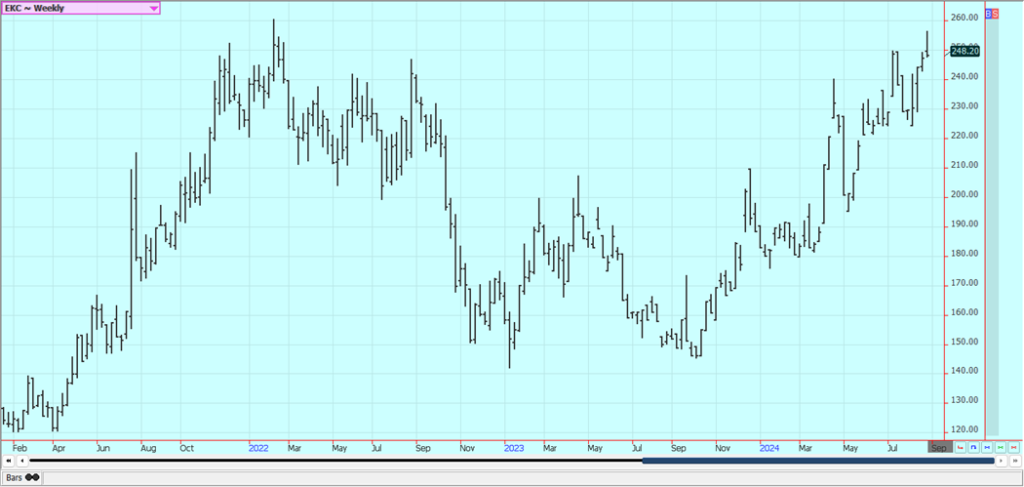
Weekly London Robusta Coffee Futures
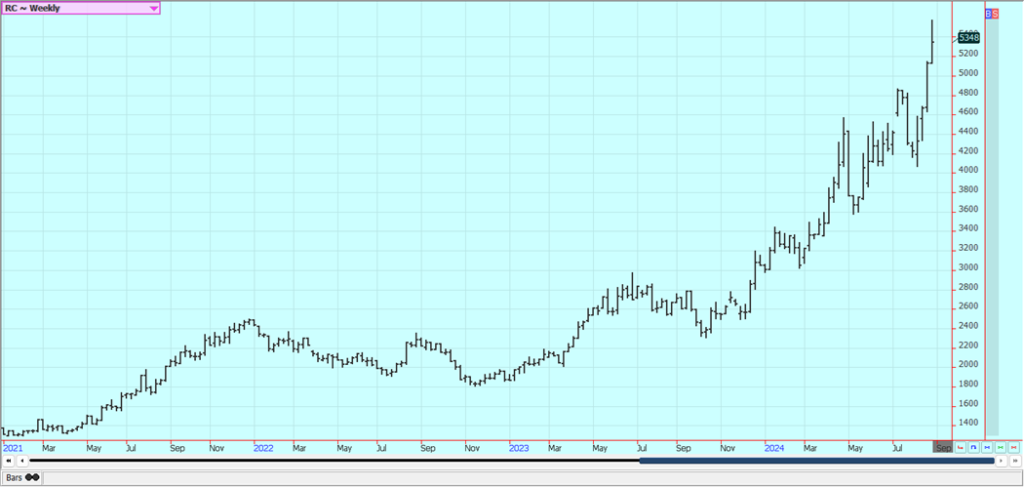
Sugar: New York and London closed higher last week on what appeared to be speculative and commer-cial buying. Unica reported on Wednesday that sugar production in the Cener-South of Brazil totaled 3.11 million metric tons, down 10.2% from last year. Chinese demand in particular is in focus amid the economic problems seen there. Harvest progress in Brazil and improved growing conditions in India and Thailand are the important fundamentals and growing conditions are dry in Brazil.
Indian and Thai mon-soon rains have been very beneficial and mills are expecting strong crops of cane. They are pushing the governments to allow exports but so far the governments have not agreed. Production estimates were raised in the northern hemisphere. Harvest yields of Sugarcane in Brazil are strong but should start fall-ing but not enough to impact prices much. The ISO forecast there would be a global sugar deficit of 3.58 million metric tons for the coming marketing year.
Weekly New York World Raw Sugar Futures
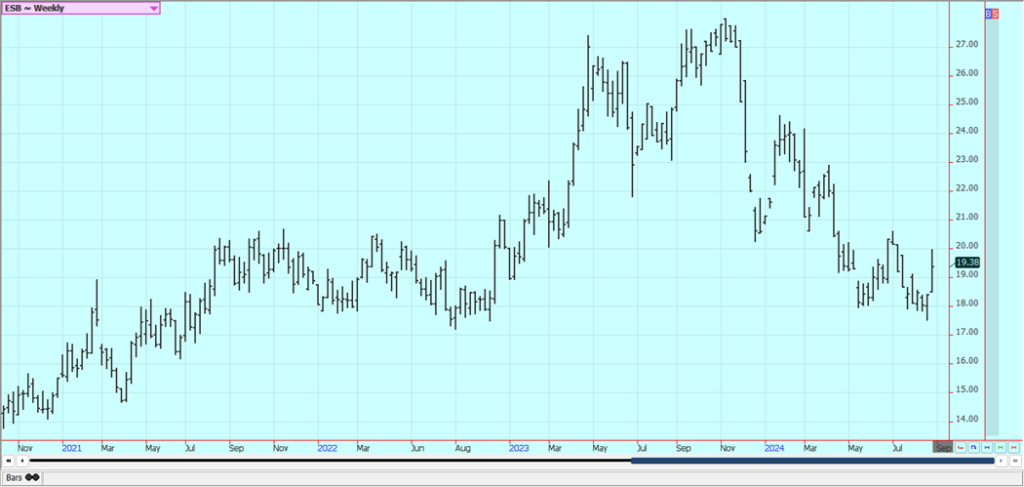
Weekly London White Sugar Futures
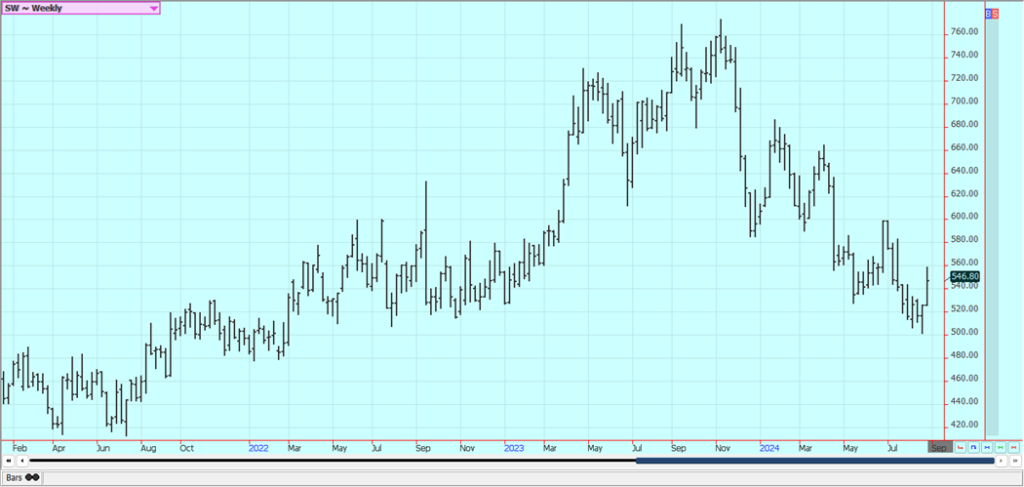
Cocoa: New York closed higher and London closed lower last week as tight supply conditions continue. Production concerns in West Africa as well as demand from nontraditional sources along with traditional buyers keep supporting futures. Production in West Africa could be stronger this year on currently dry weather in Ivory Coast. Ghana has had hot and dry conditions and there are reports that pods are being aborted. The availability of Cocoa from West Africa remains very restricted, but surplus production against demand is expected in the next crop year.
Weekly New York Cocoa Futures
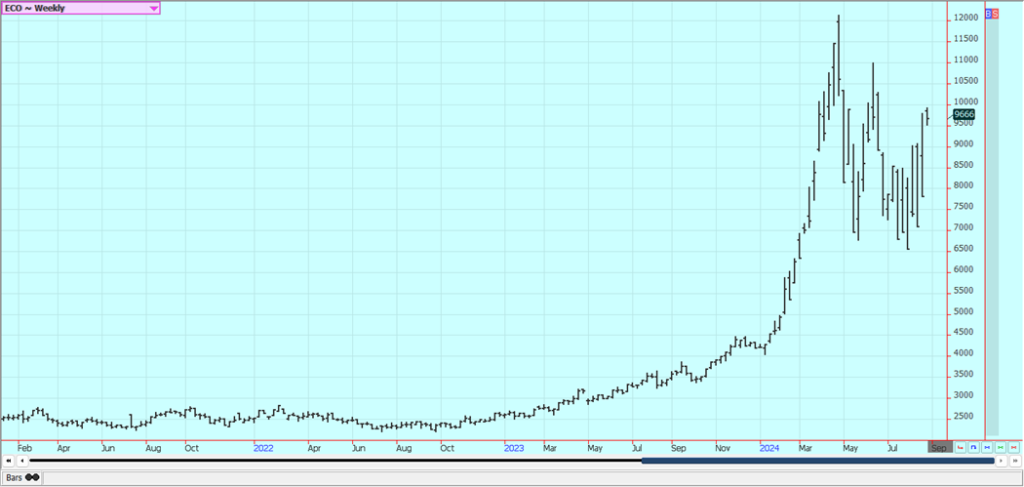
Weekly London Cocoa Futures
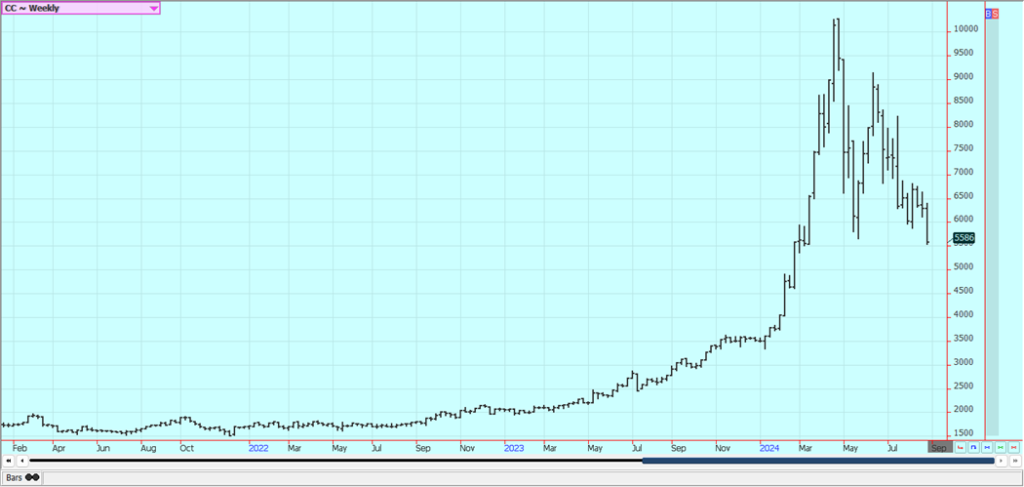
__
(Featured image by Couleur via Pixabay)
DISCLAIMER: This article was written by a third party contributor and does not reflect the opinion of Born2Invest, its management, staff or its associates. Please review our disclaimer for more information.
This article may include forward-looking statements. These forward-looking statements generally are identified by the words “believe,” “project,” “estimate,” “become,” “plan,” “will,” and similar expressions. These forward-looking statements involve known and unknown risks as well as uncertainties, including those discussed in the following cautionary statements and elsewhere in this article and on this site. Although the Company may believe that its expectations are based on reasonable assumptions, the actual results that the Company may achieve may differ materially from any forward-looking statements, which reflect the opinions of the management of the Company only as of the date hereof. Additionally, please make sure to read these important disclosures.
Futures and options trading involves substantial risk of loss and may not be suitable for everyone. The valuation of futures and options may fluctuate and as a result, clients may lose more than their original investment. In no event should the content of this website be construed as an express or implied promise, guarantee, or implication by or from The PRICE Futures Group, Inc. that you will profit or that losses can or will be limited whatsoever. Past performance is not indicative of future results.
Information provided on this report is intended solely for informative purpose and is obtained from sources believed to be reliable. No guarantee of any kind is implied or possible where projections of future conditions are attempted. The leverage created by trading on margin can work against you as well as for you, and losses can exceed your entire investment. Before opening an account and trading, you should seek advice from your advisors as appropriate to ensure that you understand the risks and can withstand the losses.

-

 Crypto1 week ago
Crypto1 week agoBitcoin Rebounds Above $70K as Crypto Markets Show Fragile Signs of Recovery
-

 Biotech6 days ago
Biotech6 days agoEurope Launches Personalized Cancer Medicine Initiative
-

 Impact Investing2 weeks ago
Impact Investing2 weeks agoEnfinity Launches First Solar Plant in Italy with Microsoft
-

 Crypto2 days ago
Crypto2 days agoBitcoin Wavers Below $70K as Crypto Market Struggles for Momentum
